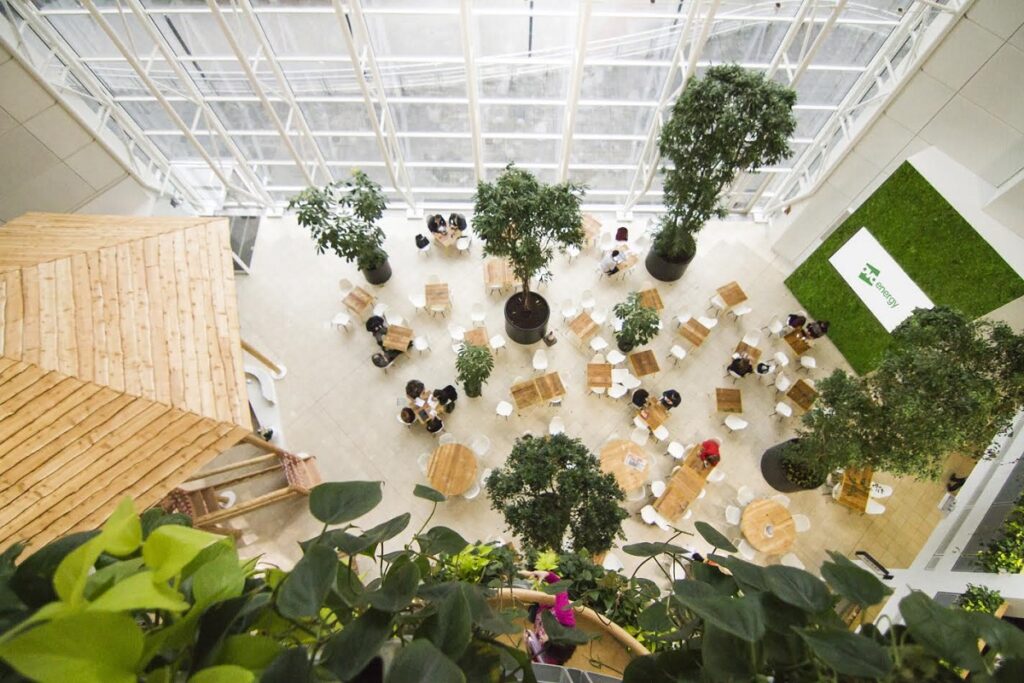OVO is a fast-growing energy company based in Bristol, already making a name for themselves both as a challenger within the industry and for having strong focus on company culture and values, having grown from a handful of employees seven years ago to over 1,200 today.
We headed over to Ovo’s foliage-filled office to take a look at their treehouse, test out the slide and talk to their Head of People Performance, Libby Townsend.
Shonette Laffy, HRZone: How would you describe the culture at OVO?
Libby Townsend, OVO: We are very proud of what we’ve built to date, but humble enough to know that there’s still a lot to do. I started with OVO four years ago and we were 90 people working out of an airbase in Kemble, but it was clear even then that people were equal to customers (that’s only got stronger as we’ve grown and evolved) and that all PR had to start internally.
We’ve always been very values-led and although our values have evolved over time in terms of how we articulate them and what they mean, they’ve always been the same. That’s what we’ve always rested on in terms of how we recruit – people have to be in line with our values.
We’ve got three main values that we recruit to:
- we’re the good guys
- we find a way
- we’re building something great
It’s all about attracting people – and this quite grandiose – who want to change the world for the better. We’re in an industry where in the past we’ve been quite provocative to the big six, but we’ve changed over time to want to show a better way for energy, and be role models rather than challengers. The ethos to building something great is building something sustainable for everyone.
We have fun too; it’s vibrant, somewhere where if you don’t like change it won’t be a comfortable place to be. As part of our recruitment process not only do we screen on values but also look at general learning agilities – mental agility and change agility.
Change is so important; we’ve grown so rapidly that whilst we look for competence and skills we find that if you have good change and mental agility you can be put in any position, not be freaked out by it, and actually innovate. It’s not the sort of place you can just apply past experience, you have to be able to adapt and evolve.
Shonette Laffy, HRZone: How many steps are there in recruitment after initial screening?
Libby Townsend, OVO: It depends on which part of the business you’re working in; for our volume areas – so contact centres, energy operations, customer service – there’s an assessment centre that takes you through a holistic interview based on some questions; they’re not competency-based questions as we find they’re very leading and actually what’s better to do is ask something like “What did you enjoy most out of xxx” rather than “Tell me when you’ve demonstrated this”.
In the assessment centre process there’s also a group activity, and of course the dreaded role play! But actually it’s really interesting from a customer service perspective – you need to have that opportunity to see and understand the sort of language that they use, whether it’s ‘on brand’ or not, and then they will get offered at the end of that day – we have quite a quick turnaround.
We try and push out the responsibility to line managers; all line managers are trained in holistic interviewing
In other areas of the business we try and push out the responsibility to line managers; all line managers are trained in holistic interviewing, but someone from the People Team will also come in – whether it’s a business partner or part or the resourcing team – to do a sort of ‘HR check’ from a values perspective.
Everyone we recruit completes an online psychometric assessment which tests mental agility.
Shonette Laffy, HRZone: And how do you recruit people for such a fast-changing company?
Libby Townsend, OVO: It’s a mutual process; this a really fun place to work and you’ll get so much out of it, but if you like things to be standardised, if you like processes to have a beginning, middle and end, then this is going to be quite a stressful environment for you, so I guess what we’re trying to do in the recruitment process is screen for people who are able to bend, able to flex, able to think outside the box, able to innovate in their own space.
We talk about having ‘sandboxes’, where we have high trust in people being able to do their jobs and do the job in the way that is best for them, and that goes for hours too – but being really clear about where the edges of that ‘sandbox’ are. So, “these are the things that are within your control – anything in your ‘sandbox’ you can break, you can change, you can influence, but then outside the sandbox are the things you must follow”.
We hire people who want to think for themselves, who want to be a force for good.
It’s trying to strike the balance between the important processes – the ones we want to hold on tight to – and having other things that we can be really fluid on and give people control over. It’s about clarifying that and making people feel empowered.
If you’re not the sort to stick your head above the parapet you’re not really an OVO kind of person; we’re trying to build something great together so we have to think independently but also know the things we need to join together on and collaborate. We hire people who want to think for themselves, who want to be a force for good.

Shonette Laffy, HRZone: What does your onboarding process look like?
Libby Townsend, OVO: We map our customer experience and we map our employee experience; onboarding is super important as we need to get people up to scratch with things so they can be proficient, be motivated and add value quickly.
We have the traditional day one corporate induction, which is always raved about – 92% would recommend to a colleague. No matter where you work in OVO, whether it’s in London or out in the field, we get everyone to come here to Bristol so they get that exposure to what we’re about.
After that it’s down to the line manager – all of our managers have gone through our leadership program at OVO University, which touches on ‘What does effective onboarding look like? What are the touchpoints, what should you look out for?’, but there’s still that sandbox where we say “How do you want them to feel? Do you want to send them a message before they start?” – we’re not so scripted that they have to send a card and this is the messsage etc, but rather the manager sets the tone and culture for their team which is based on our OVO values, so it should all follow suit. We try not to be prescriptive – we allow managers to manage.
We try not to be prescriptive – allow managers to manage.
As part of the onboarding process there’s also an introduction to OVO University and we’ve also got a number of benefits we want everyone to understand. There’s also an energy crash course for people new to the industry to learn a bit more about the context that they’re working in.
The contact centres and volume areas have quite a lot of technical training; I think we’re quite generous in that we give six weeks of training but we want people to feel that they have enough knowledge to go out and deliver great customer service.
Shonette Laffy, HRZone: Tell me more about OVO University – what sorts of courses do you offer?
Libby Townsend, OVO: They’re all focused on the soft skills side; leadership is our biggie and that’s across all levels of the business from line managers to the exec team.
We’ve got a range based around our core capabilities and things we need to improve on to deliver our business plan: managing data, designing for simplicity, harnessing & developing talent, communicating effectively. We have a range of courses from foundation to advanced level.
Shonette Laffy, HRZone: Are employees allocated a certain number of hours for professional development, or is that something that needs to be decided on an individual basis?
Libby Townsend, OVO: Everyone is allowed up to four OVO University days per year, anything above that is decided on a needs basis.
If you’re a ‘high potential’ you’ll get more and more spend allocated to you. We do have a meritocracy in that if you do achieve more you get more; whether that be bonus or spend on development.
Shonette Laffy, HRZone: How do you tend to structure exit interviews?
Libby Townsend, OVO: We have a basic exit survey but it depends on the area of the business whether a member of HR or manager will speak with the person.
In our Customer Service Team we sit down with every single leaver to understand and get a temperature check of the culture in the team, so we can get a good idea of why people are leaving.
We need to be careful how much we’re asking if we aren’t then able to change things as a result.
We do a lot of feedback and focus groups across the business; we listen a lot – probably too much! It’s about listening at the right times and being able to implement a strategy to deal with it effectively, for example with our working hours – we’ve reduced our working hours and introduced flexitime which has gone down a storm. But overall we need to be careful how much we’re asking if we aren’t then able to change things as a result.
Shonette Laffy, HRZone: And what’s next for OVO?
Libby Townsend, OVO: The main thing we’re supporting right now is that we’re moving towards digital – our technology part of the organisation is growing, we are trying to make sure that all of our customers can self-serve online and have excellent technology that works every time.
From an HR perspective it’s about making sure that we have a very attractive recruitment strategy for attracting the best talent within tech such as developers; we’ve gone through the first part of a restructure of our tech team to put our customers at the centre of everything we do.
So it’s making sure that our tech teams have good career paths – like at Spotify they have autonomous product teams but they share their learning across what they call ‘Chapters’ – so if you’re enthusiastic about Java Script it’s sort of a social-led club for getting good at Java Script, so we’re starting to set up a similar sort of social learning team.
Change is something that we do, it’s what we recruit for
We’ve brought in a new People system to allow managers and employees to self-serve, as well as our ongoing quest to be a Top 10 Best Company to work for, which doesn’t happen overnight – making sure all the layers whether it’s reward, wellbeing, development…all of that needs to happen and it’s a careful balance to make sure you’re doing it well and not prioritising one over the other.
But change is something that we do, it’s what we recruit for – it wouldn’t be OVO if we weren’t changing constantly.








One Response
Thank you for sharing your
Thank you for sharing your meeting insights…